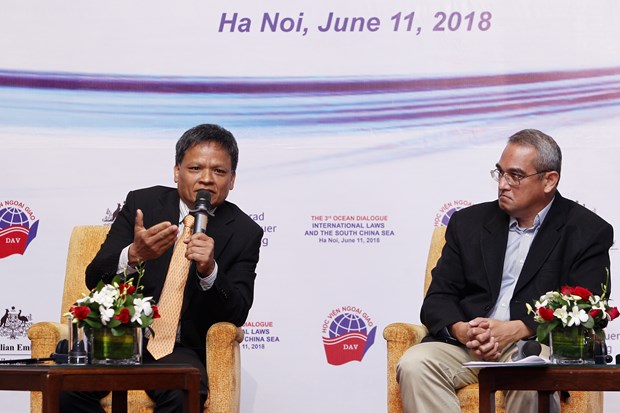Ocean dialogue seeks ideas for cooperation, dispute management
An ocean dialogue took place in Hanoi on June 11 to discuss the East Sea situation and seek ideas for cooperation and management of disputes in the region.
 Vice Chairman of the United Nations International Law Commission Nguyen Hong Thao (L) speaks at the third ocean dialogue in Hanoi on June 11 (Photo: VNA)
Vice Chairman of the United Nations International Law Commission Nguyen Hong Thao (L) speaks at the third ocean dialogue in Hanoi on June 11 (Photo: VNA)Hanoi (VNA) – An ocean dialogue took place in Hanoi on June 11 to discuss the East Sea situation and seek ideas for cooperation and management of disputes in the region.
The third ocean dialogue was organised by the Diplomatic Academy of Vietnam, the Konrad-Adenauer-Stiftung (KAS) foundation of Germany, and the Australian Embassy in Vietnam.
It saw the presence of Vice Chairman of the United Nations International Law Commission Nguyen Hong Thao, Assoc. Prof. Dr. Herman J. Kraft from the University of the Philippines, and Dr Yan Yan from China’s National Institute for South China Sea Studies.
The event took place when the new happenings in the East Sea have created many security and legal problems for countries in the region.
China and the ASEAN countries are negotiating a Code of Conduct (COC) of parties in the East Sea. However, two years since The Hague tribunal’s ruling on the Philippines’ lawsuit against China, the countries have yet to reach considerable cooperation outcomes to ease tensions and disputes in the region.
Opening the dialogue, Deputy Director of the Diplomatic Academy of Vietnam Le Hai Binh underlined the role of international law in maintaining international security and order, adding that international law is the basis for ensuring security and stability in the region and the world.
In the East Sea, all relevant parties declared that they adhere to international law, but the differences in law interpretation have posed a big challenge to regional cooperation, he noted.
Peter Girke, a representative of the KAS foundation, said the East Sea needs common and peaceful solutions complying with international law to settle territorial disputes.
Meanwhile, Counsellor at the Australian Embassy Stacey Nation said the embassy co-held the third ocean dialogue to affirm her country’s commitment in its Foreign Policy White Paper to promoting a secure, open and prosperous Indo-Pacific region in which the rights of all states are respected and disputes are resolved peacefully in accordance with international law.
Speakers at the event discussed many legal issues related to the East Sea, including the principle of respecting law, the legal status of entities, and The Hague tribunal’s ruling in the Philippines’ lawsuit. They also looked into legal aspects of the idea of cooperation for common development in the region, the COC, and measures to promote common viewpoints on international law in the East Sea.-VNA













